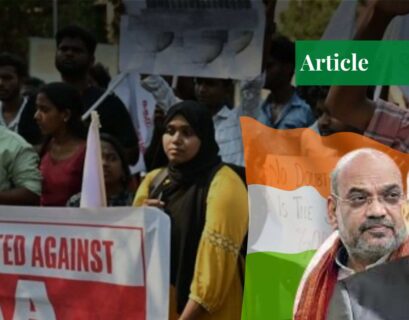Mr Usama Bin Zafar is a final-year law student at Lahore University of Management Sciences (LUMS) with a keen interest in constitutional law and jurisprudential development.
In Pakistan’s delicate constitutional history, a few verdicts stand out as true turning points, challenging oppressive regimes, and reinvigorating the spirit of justice. One such historic milestone is the recent order that termed military trials unlawful for civilians issued by the five-member bench of the Supreme Court—comprising Justice Ijaz ul Ahsan, Justice Munib Akhtar, Justice Sayyed Mazahar Ali Akbar Naqvi, and Justice Ayesha A. Malik, with only Justice Yahya Afridi expressing reservations on one aspect.
In the constitutional petition of Jawwad S. Khawaja v. Federation of Pakistan, the Apex Court, invoking its original jurisdiction under Article 184(3) of the constitution, delivered a landmark verdict. It declared clause (d) of subsection (1) of Section 2 of the Pakistan Army Act, 1952 (both sub-clauses (i) and (ii)) and subsection (4) of Section 59 of the same Act, introduced by Ordinance III of 1967, as “ultra vires,” effectively stripping them of their legal weight.
However, the significance of this ruling extends far beyond mere legal jargon. It marks a resolute stance on the separation of military and civilian jurisdictions. The court unequivocally established that civilians and accused persons, numbering approximately 103, who were linked to the events of 9th and 10th May, 2023, should exclusively face trial in the competent criminal courts. Furthermore, the ruling declared that any actions or proceedings under the Army Act, when applied to civilians, are devoid of legal merit.
To truly appreciate the historical importance of this ruling, one must revisit those critical junctures in our nation’s history when the Pakistani judiciary stood at a crossroads, deliberating the fundamental rights of our citizens. These pivotal moments posed a fundamental question: could a citizen be stripped of the liberties enshrined in the constitution and subjected to the jurisdiction of a military authority enforcing the dictates of a generalissimo?
A closer examination of historical decisions reveals that, in most instances, the gavel’s roar was silenced by the thump of military boots, resulting in precedents like Brig (RETD) F.B. Ali v. the State. In this contentious legal interpretation, the court expanded the scope of clause (d) within Section 2 of the Army Act, introduced by Ordinance No. III of 1967. This clause, stating “persons not otherwise subject to this Act,” has been construed to encompass a wide range of individuals, including civilians with no prior military affiliations.
The majority opinion, authored by Justice Hamoodur Rehman, C.J., adopted a strict approach to the constitution, asserting that the parliament was well within its legislative competence to make such an amendment. The decision hinged on positivist law, excluding philosophical considerations such as reason or morality. The lone dissenting voice belonged to Justice Anwar ul Haq, who, while largely aligning with his fellow judges, penned a separate dissenting note. He argued that “law” should not be restricted to positive law alone but should also be interpreted considering judicial principles established by superior courts in Pakistan over time.
The appellants raised valid concerns about the fundamental right to a fair trial, drawing on former Chief Justice Munir’s criteria for a “fair trial” outlined in the Constitution of the Islamic Republic of Pakistan, 1962. These criteria included the right to know the charges and evidence in advance, the ability to cross-examine prosecution witnesses, the right to present a defence, the right to appeal or request revision, the right to legal representation, the right to have the case decided by the presiding judge, the right to certain presumptions and defences, and the right to request a change of venue.
However, their pleas fell on deaf ears, leaving them at the mercy of the military junta. This was only the beginning of the military courts saga, and later, whenever a situation of crisis arose for the executive, either in the form of sedition, treason, or state-wide terrorism, it used the military courts as a panacea to cure its ills. Just when the doors were closed on the military trials of civilians in the case Sheikh Liaquat Hussain v. Federation, the most divided judgment in history—District Bar Association v. Federation of Pakistan—revived the spectre of Orwellian military tribunals, culminating in upholding the death penalty awarded by them military tribunals to the sixteen individuals in Said Zaman Khan v. Federation of Pakistan.
The recent verdict is an active effort to render the military trials of civilians a thing of a bygone era. It is an assertion that no one, regardless of circumstance, is above the law, and every citizen has an inalienable right to “due process” and “fair trial” as envisioned in Article 10-A of the Constitution. As history’s pages continue to turn, one can only imagine the reverence with which it will judge these judges.
In the words of Robert F. Kennedy,”Few will have the greatness to bend history itself, but each of us can work to change a small portion of events.” The members of this bench, through their unwavering commitment to justice, have indeed bent the course of Pakistan’s constitutional history for the better.
If you want to submit your articles, research papers, and book reviews, please check the Submissions page.
The views and opinions expressed in this article/paper are the author’s own and do not necessarily reflect the editorial position of Paradigm Shift.



















